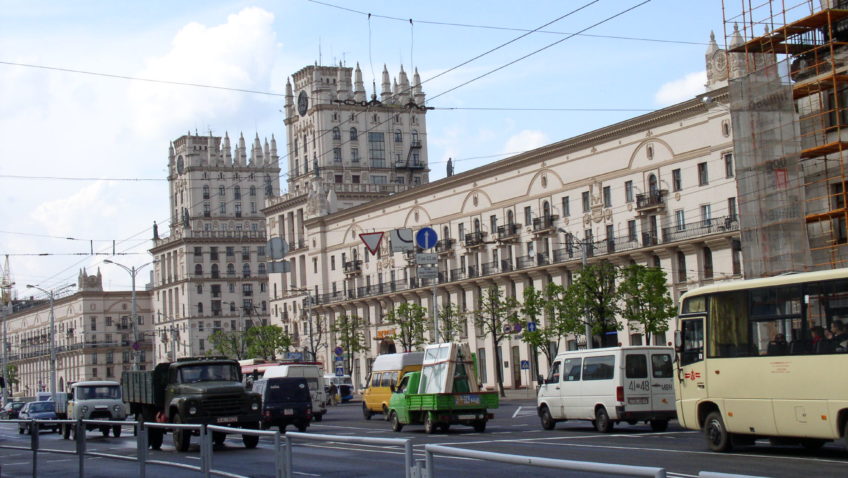Compiled by Eva Jovanova and Hristo Voynov
1. Kosovo President Hashim Thaci prepares for a meeting in Brussels with his Serbian counterpart, Aleksandar Vucic, that is scheduled for next week. Thaci promises that a correction of borders will “address the injustices that have been done to the Albanian people in the past”. This Wednesday, he also announced that a referendum will be scheduled on the potential peace agreement between Serbia and Kosovo, and believes that this deal will open Kosovo’s door towards NATO and EU membership.
2. Russia is raising eyebrows as it prepares to host its largest war games since 1981 in mid-September. It will be massive, featuring 300,000 personnel, “36,000 tanks, armored personnel carriers and armored infantry vehicles”, and roughly 1,000 aircraft. It will not be in the West near NATO as many of its recent major exercises have been, but instead in the East of the country where it will feature China and Mongolia as training partners. The games are at a difficult time for Moscow, where an economy weakened by sanctions must pay for what Russia’s leaders see as the need for the country to show that it can defend itself against what it sees as Western aggression.
3. Bulgaria’s tragic bus crash on August 25 in which 17 people lost their lives and many were injured, is the cause for three ministerial resignations. Prime Minister Boyko Borisov’s cabinet will part from the ministers of interior, transport, and regional development, once the Parliament approves the resignations. The bus crash is still under investigation.
4. While relations between Russia and Ukraine may be at an all-time low, this week included steps which complicate any future peace effort between the two. Ukrainian President Petro Poroshenko stated marked independence day by claiming that Ukraine has “cut all ties with the Russian Empire” and must even cut off ties with the Russian Orthodox Church. While his claim is an abstract one, it includes acts such as the shutting down of Ukrainian offices in all country members of the CIS, or Commonwealth of Independent States, a loose union of former Soviet republics. This week the OSCE also accused Russia of complicating its efforts along the border, while one of the unrecognized breakaway republics in Ukraine, the Lugansk People’s Republic, decided to postpone its elections because of what it claims are commitments to the Minsk Peace Agreement.
5. Macedonia seems to have a promising future! According to a nationwide poll conducted by IRI, a month before the referendum on the Macedonia-Greece agreement, support for EU and NATO membership keeps growing. The main opposition party is still undecided on whether to participate in the referendum or to boycott it.
6. Russian President Vladimir Putin faced an unusually strong backlash over pension reforms. His proposal to raise the retirement age resulted in significant protests, and a decline in his approval rate, which prompted a scaling back of the reforms in which the proposed raise for women’s retirement, from 55 to 63 was reduced to 60, but the 5 year increase from 60 to 65 for men would stay. In defense of the reforms, he cited the growing age of Russia’s working population and the need to keep the Russian economy moving. According to the state polling agency, VTsIOM, his approval rating fell significantly since the announcement, from roughly 75% to 64%.
7. Bosnia located US embassy gave a statement that the possible land swap between Serbia and Kosovo should not cause fear of secession in Bosnia and Herzegovina. The redrawing of borders will most probably enclose the Albanian majority town of Presevo to Kosovo, and the Serb-majority parts in Northern Kosovo to Serbia. The head of the Serb majority entity Republika Srpska in Bosnia and Herzegovina has publicly shown secessionist tendencies numerous times so far, which has now become as sensitive as ever.
8. Moldovans held two more major protests, this time with wider reaching messages compared to the previous round which focused on the controversial Chisinau elections. On August 26th, the focus was also on oligarchs, with an emphasis on Vladimir Plahotniuc who is the president of the Democratic Party of Moldova which is an ally within the pro-Russian wing of the Moldovan government. On the 27th, Moldovan Independence day, protesters maintained a strong presence but were kept aside to continue the state-sponsored celebrations.
9. Albania was sharply criticized by the European Court on Human Rights due to an attempt its government made in 2014 to influence court proceedings. The government had tried to adjourn court processes on restitution of property in times of Communism. The attempt had been fruitless. ECHR is now accusing Prime Minister Edi Rama’s government of blackmail and bribery.
10. Belarus appears to be in the middle of a crackdown of civil society. Earlier this month, at least 18 journalists were detained for “alleged unauthorized access to paid services of the government-owned BelTA news agency” and one blogger was detained for criticizing a government statement. While the journalists were released, many of them are now not allowed to leave the country. In a similar case, two union organizers were just sentenced to “restricted freedom” for organizing street protests in 2017.


0 comments